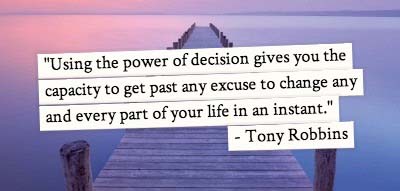Success Advice
5 Habits To Drop if You Want To Be Successful

Most people believe that a lack of success is due to their own personal faults. They think that not being the best, the brightest, or the most intelligent will stifle their growth, and make going after their most prized aspirations futile.
The Truth? Not being the smartest, or the most talented won’t hinder your success, but hanging on to destructive habits will.
Habit #1: Expecting yourself to live up to others’ expectations
Your girlfriend? Your friends? Your boss? They’re all people who don’t have to walk a single day in your shoes and will never know what it is like to live your life. So, why is it that their opinions hold so much weight?
When you focus on meeting other people’s expectations, you’re forced into a position where you have to meet all the conditions associated with those expectations, and if you don’t you can end up ruining valuable relationships, and important connections.
Setting your own expectations will force the people around you to see you as an individual, and will allow you to define success on your own terms.
Habit #2: Obsessing over things that don’t matter
You feeling like a hotshot in front of your lady friends? Doesn’t matter.
You experiencing true happiness, and having the ability to pursue any dream possible? Now, that matters.
It can become so easy to fall into this treacherous habit, and start to worry about what others think of you, or and what you should be doing with your life, but at the end of the day only you have to live with yourself. Don’t worry about your friends, and family; they have their own lives to live, and their own problems to bear. Worry about yourself, and about how you can go to bed every night happier, healthier and more content than the last day.

Habit #3: Dwelling on past failures
It’s normal to hate yourself sometimes, but it does you absolutely no good to provoke that self-hatred by dwelling on your mistakes. When you feel down on yourself, look at it as an opportunity to learn.
If you fail, instead of tearing yourself apart, tear your failure apart. Rip it up and destroy it, then take a long, hard look at the pieces. When it’s all laid out there before you, you have the chance to transform your negative thoughts into insightful questions. Turn, “That was a crappy decision.” into “What led me to think this was a solid decision?” While a certain amount of negative thinking can drive us to become better and stronger people, it is much more beneficial to adopt habits that lead us to question why we failed rather than dwelling on failure itself.
Habit #4: Bragging about your big dreams
Nobody cares that you want to be an actor until you’re on the big screen and they can say, “I knew that guy when he worked at Taco Bell.” Until that day, you’re just slinging tacos, and any attention you direct to your optimistic future will be met with doubt, and pity.
The more time you spend talking about your dreams, the less time you’re spending going after those dreams. In a lot of ways, dreams are like children: they’re something that you should be proud of, something that belongs to you, but when you start unfolding that picture folio in your wallet, everyone groans.
Just like children though, you’ve got to take care of your dreams and you’ve got to take steps to ensure they have the necessary means to develop. There’s nothing wrong with carrying constant reminders of your goals to keep you focused, but keep them to yourself.
Habit #5: NOT being a sore loser
Anger is very often portrayed as a negative emotion, but it doesn’t have to be. There’s a virtuous quality to anger that very few realize is present: When people are angry, in their minds they are right, and to rectify the situation they blow up. Or curse out their boss. Or punch a wall. Or lock themselves in their apartment, and spend three days shouting obscenities and drinking beer.
The good news is, blowing up, getting angry, and feeling like the world is against you is perfectly healthy, and is an essential part of eventual success. While dwelling in your anger for too long can impede your personal development, basking in your righteousness for a few days after a defeat can motivate you to try harder, and work smarter.
Humans are creatures of habit, and the behaviors that we display on the daily basis define who we are, and what path ous lives take. This means that true success comes from implementing the right habits, and dropping the ones that hold you back.
Business
The Simple Security Stack Every Online Business Needs
Most small businesses are exposed online without realising it. This simple protection stack keeps costs low and risks lower.

Running a business online brings speed and reach, but it also brings risk. Data moves fast. Payments travel across borders. Teams log in from homes, cafés, and airports. (more…)
Business
If Your Business Internet Keeps Letting You Down, Read This
From smoother operations to better security, dedicated internet access is quietly powering today’s high-performing businesses.

Today, a dependable internet service is the bedrock for uninterrupted business operations. Many organizations rely on stable online connections for communication, data transfer, and customer interaction. (more…)
Did You Know
How Skilled Migrants Are Building Successful Careers After Moving Countries
Behind every successful skilled migrant career is a mix of resilience, strategy, and navigating systems built for locals.

Moving to a new country for work is exciting, but it can also be unnerving. Skilled migrants leave behind familiar systems, networks, and support to pursue better job opportunities and a better future for their families. (more…)
-

 Health & Fitness2 weeks ago
Health & Fitness2 weeks agoWhat Minimalism Actually Means for Your Wellness Choices
-

 News1 week ago
News1 week agoBrandon Willington Builds 7-Figure Business by Ignoring Almost Everything
-

 Did You Know2 weeks ago
Did You Know2 weeks agoWhy Most Online Courses Fail and How to Fix Them
-

 Business2 weeks ago
Business2 weeks agoIf Your Business Internet Keeps Letting You Down, Read This
-

 Business2 days ago
Business2 days agoEntrepreneur’s Guide to Pay Stubs: Why Freelancers and Small Business Owners Need a Smart Generator
-

 Business13 hours ago
Business13 hours agoThe Simple Security Stack Every Online Business Needs
-

 Finances16 hours ago
Finances16 hours agoWhy Financial Stress Is One of the Biggest Barriers to Personal Growth
-

 Scale Your Business5 hours ago
Scale Your Business5 hours ago5 Real Ways to Grow Your User Base Fast


























12 Comments